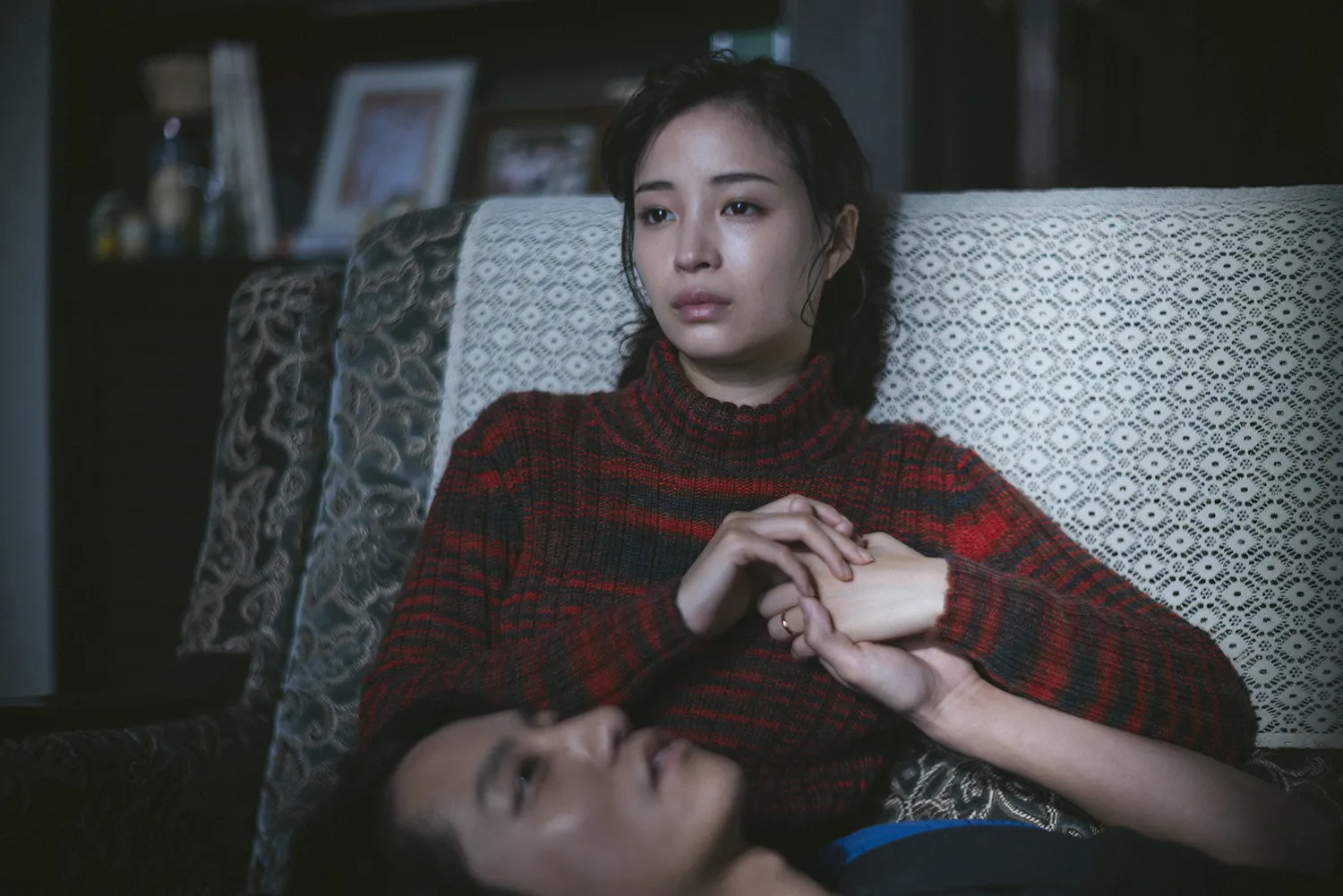A Show About Nothing, This Time From Japan

Review
A Show About Nothing, This Time From Japan
‘Asura’ is impervious to a succinct pitch, which might be why too few people have seen it.
A scene from Asura. Netflix
Years ago, in a screenwriting class, a professor explained the value—and business necessity—of the high concept project. Imagine walking into a movie theater in 1988 and seeing a poster with the enormous Arnold Schwarzenegger and the diminutive Danny DeVito, and beneath them is the one-word title: Twins. You immediately size up the premise, but have to know more. The response is instinctual: “One ticket, please.” The movie made $216.6 million, which is well over half a billion in today’s dollars.
There’s a new series on Netflix, Asura, that is impervious to such a succinct pitch, which may be why it seems so few people have seen it. The streaming giant, which has been known to take a “sink or swim” approach with its inventory, has done no promotion for Asura in the United States as far as I can tell. That’s a little perplexing, considering that the project’s writer-director-editor is Hirokazu Kore-eda.
Years ago, in a screenwriting class, a professor explained the value—and business necessity—of the high concept project. Imagine walking into a movie theater in 1988 and seeing a poster with the enormous Arnold Schwarzenegger and the diminutive Danny DeVito, and beneath them is the one-word title: Twins. You immediately size up the premise, but have to know more. The response is instinctual: “One ticket, please.” The movie made $216.6 million, which is well over half a billion in today’s dollars.
There’s a new series on Netflix, Asura, that is impervious to such a succinct pitch, which may be why it seems so few people have seen it. The streaming giant, which has been known to take a “sink or swim” approach with its inventory, has done no promotion for Asura in the United States as far as I can tell. That’s a little perplexing, considering that the project’s writer-director-editor is Hirokazu Kore-eda.
While hardly a household name, Kore-eda won the Jury Prize (unofficially, the third-place award) at the Cannes Film Festival for his 2013 film Like Father, Like Son, then the Palme d’Or (the top prize) at Cannes in 2018 for Shoplifters, which was also nominated for the best international feature film Oscar. His 1998 international breakthrough, After Life, was enough of a critical hit to warrant placement in the Criterion Collection and was adapted for the British stage. As filmmakers from outside of the Hollywood system go, he’s certainly a respected entity. Asura being in another language is no longer, thankfully, a dealbreaker for streaming success: Shogun was a hit on Hulu and at the Emmys, and is mostly in Japanese; Netflix’s number one series of all time is the South Korean satire Squid Game.
Luckily, there has been some slow, sturdy word-of-mouth, thanks to reverent articles in places like and , as well as stray social media comments from hardcore cinephiles along the lines of, “Hey, did you know that there’s a new Kore-eda project that no one is talking about?” Part of the metanarrative is the ongoing lament that there’s just too much stuff on Netflix specifically and streaming in general. One would need Star Trek’s Heisenberg compensator to actually pinpoint just how much material is available to view at any given time. (Foreign Policy’s recent inquiry to Netflix PR with the very basic question “how many films and shows did you folks release in 2024?” went unanswered.)
The problem, and it perhaps speaks more to our impatient age than anything else, is that it’s not too easy to sum up what Asura is about—and even if one can, the show itself takes its sweet time getting there. The seven episode show, set in Tokyo in 1979, is a mix of melodrama and comedy, at times very sensitive to the peculiarities of the human experience, and at others, a bit on the soap opera side of things. Characters seem, at first, to be walking allegories, representing large concepts like “tradition” or “selfishness,” but the swerving path that real life takes won’t allow anyone to be defined so easily. Just when you think you know where things are headed, you realize that you don’t—or, perhaps even more realistically, you realize that nothing is happening at all! But please don’t let any of this dissuade you from taking a look, even though (gasp) this series is now two months old.
A scene from Asura.Netflix
If I were Japanese, I’d likely have more familiarity with the source material. Asura—named for Buddhist demigods known for their passionate and sometimes conflicting attitudes—is based on a novel by Kuniko Mukoda, Ashura no Gotoku, which was adapted into a short series from 1979-80 of the same name. It was also adapted as the feature film Like Asura in 2003, which was a critical success in Japan. (It does not appear that it was ever released in the U.S.) The set-up is this: Four sisters, who vary greatly in age, become aware that their 70-year-old father has been having an affair. This revelation kicks off a number of other small dramas, some of which can get a little dishy. Infidelity is a recurring theme.
My favorite thing about Asura, which rang very familiar, is that whenever conversations get serious or heated among the four siblings, there is always space for some laughter, or for ribbing someone about something inconsequential. Even during what that old screenwriting professor would call the “instigating event”—the summit in which one daughter informs the others what she’s learned about their dad—there are pauses and asides and chatter. If there is a thesis to Asura, it’s that families are powered by mysterious engines, and life does not follow a succinct script.
Rie Miyazawa plays Tsunako, the eldest daughter, who tends to wear traditional dresses with obi belts that can sometimes form an elaborate bow. A widow with a grown and mostly off-screen son, Tsunako works as a floral arranger at an upscale restaurant … and is also having an affair with her boss, who co-manages the place with his wife. The main character might be considered Makiko, played by Machiko Ono, inasmuch as a lot of the action takes place at her house, or with her on the phone as a conduit to everyone else. She is a mother of two teens, and her husband is a successful businessman who may or may not be having an affair with his secretary. (He certainly seems to be very sympathetic to the women’s father’s side of things.) The switcheroo here is that you would think that someone with the crackle of youth in her house would make her a bit more modern than her taciturn older sister, but their attitudes soon prove this not necessarily so.
Third in the mix is Yu Aoi as Takiko, a very mousy librarian who is first to suspect her father’s philandering. In fact, she’s the one who hires a private detective, a somewhat oafish dude named Katsumata who ends up hanging around quite a bit, before developing feelings for Takiko. Finally, there’s Suzu Hirose as Sakiko, the very pretty restaurant hostess who is shacked up with a would-be boxer named Jinnai. At first there’s some comedy about the pair needing to abstain from intimacy to aid in Jinnai’s chances at the championship, followed by the revelation that the pugilist is playing around. After a time jump, however, he does achieve fame and fortune, altering Sakiko’s life significantly.
The characters in Asura are not afraid to discuss the big secrets in their lives, but they do seem to be unable (or unwilling) to do much about them. Not much needs to be forgiven because no one stays too mad for too long. It’s very hard to explain—and seems anathema to the notion of drama—but when I think about the people orbiting my own life, this inertia rings true; is it just me, or do you also find yourself hearing or repeating the phrase “they’re working it out”?
That said, for all the realism in the show, there’s an awful lot of swooning. For every three scenes of John Cassavetes-like naturalism, there’s a story beat from The Young and the Restless.
A cooking scene from Asura.Netflix
Another important aspect to this series is the cooking, serving, and eating of food. Every episode has someone packing rice cakes or cooking up sukiyaki or debating whether to add potatoes to a recipe. Once in a while they splurge and order sushi. The constant presence of food adds to the show’s intimacy and the warmth, even if, at the same time, some of the characters are really angry at someone else. There are also some remarkable glimpses at Japanese traditions that were alien to me. I actually had to hit pause during one sequence to learn about mame-maki, in which people throw beans to ward off evil spirits. (For the main family on their calm street in Tokyo, it’s nothing so organized—just chucking things at kids out the door, with a vibe similar to that of handing out Kit-Kats on Halloween.)
Another sequence centers on the discovery that the sisters’ septuagenarian mother held onto some elaborate sketches given by her mother as a wedding gift, meant as a guide to understand marital intimacy. (I have Googled to try and find the Japanese term for this custom, and the results I’ve received for “traditional Japanese mother daughter sex education pictures” are nothing I feel comfortable clicking.) As an outsider, there’s no better way to learn about customs than through characters you care about—and the revelation about the pictures, as with so much else in the series, comes with laughter.
Kore-eda, whose previous films have all been rich with this humanist specificity, is really working in a sweet spot here, but I do understand why this project may not be conquering the algorithm. While I was watching one of the seven hour-long episodes, my wife drifted into the living room to ask what was happening onscreen. My response was perhaps uninspiring: “Uh, these two are sisters, and she thinks that the other one should stop sleeping with her boss, but she doesn’t work there anymore, so she actually isn’t too hung up about it, really. Anyway, they are going to cook dinner now.”
I know—it sounds riveting. And maybe it isn’t what we expect from modern TV. But it is a lot like life.
Jordan Hoffman is a film critic and entertainment journalist living in Queens, New York. X: @jhoffman
More from Foreign Policy
-

Samuel Huntington holds his hand to his chin while sitting in an office. Samuel Huntington Is Getting His Revenge
The idea of a global “clash of civilizations” wasn’t wrong—it was just premature.
-

U.S. President Donald Trump meets with Ukrainian President Volodymyr Zelensky at the White House on Feb. 28. The Perils of a Reality TV Presidency
The Trump-Zelensky shouting match is a reminder that international diplomacy was never meant to be carried out in front of billions of eyes.
-

A Ukrainian serviceman trains in the woods near the frontline in Ukraine. Three Years On, What’s Next for Europe and Ukraine?
Nine thinkers on the bombshells coming out of Washington.
-

Donald Trump is seen inside a helicopter at night looking down at a cell phone Trump’s New Map
America’s first post-literate president has only geography to fall back on.










Join the Conversation
Commenting on this and other recent articles is just one benefit of a Foreign Policy subscription.
Already a subscriber?
.
Subscribe
Subscribe
View Comments
Join the Conversation
Join the conversation on this and other recent Foreign Policy articles when you subscribe now.
Subscribe
Subscribe
Not your account?
View Comments
Join the Conversation
Please follow our comment guidelines, stay on topic, and be civil, courteous, and respectful of others’ beliefs.
Change your username |
Log out
Change your username:
CANCEL
Confirm your username to get started.
The default username below has been generated using the first name and last initial on your FP subscriber account. Usernames may be updated at any time and must not contain inappropriate or offensive language.